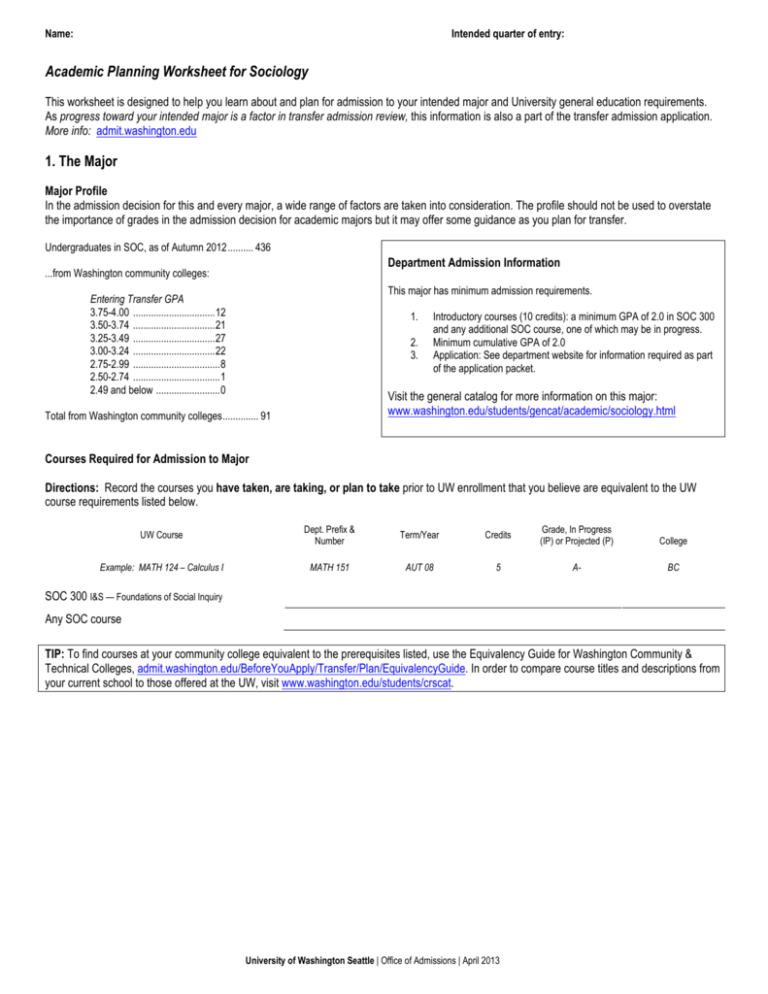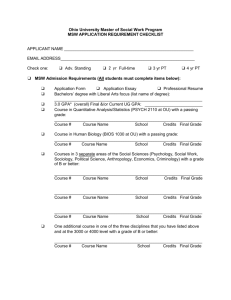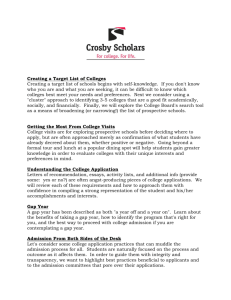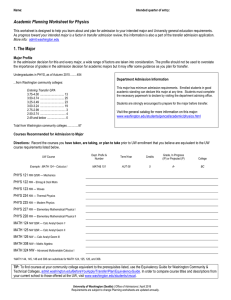Academic Planning Worksheet for Sociology 1. The Major
advertisement

Name: Intended quarter of entry: Academic Planning Worksheet for Sociology This worksheet is designed to help you learn about and plan for admission to your intended major and University general education requirements. As progress toward your intended major is a factor in transfer admission review, this information is also a part of the transfer admission application. More info: admit.washington.edu 1. The Major Major Profile In the admission decision for this and every major, a wide range of factors are taken into consideration. The profile should not be used to overstate the importance of grades in the admission decision for academic majors but it may offer some guidance as you plan for transfer. Undergraduates in SOC, as of Autumn 2012 .......... 436 Department Admission Information ...from Washington community colleges: This major has minimum admission requirements. Entering Transfer GPA 3.75-4.00 ................................ 12 3.50-3.74 ................................ 21 3.25-3.49 ................................ 27 3.00-3.24 ................................ 22 2.75-2.99 .................................. 8 2.50-2.74 .................................. 1 2.49 and below ......................... 0 1. 2. 3. Introductory courses (10 credits): a minimum GPA of 2.0 in SOC 300 and any additional SOC course, one of which may be in progress. Minimum cumulative GPA of 2.0 Application: See department website for information required as part of the application packet. Visit the general catalog for more information on this major: www.washington.edu/students/gencat/academic/sociology.html Total from Washington community colleges .............. 91 Courses Required for Admission to Major Directions: Record the courses you have taken, are taking, or plan to take prior to UW enrollment that you believe are equivalent to the UW course requirements listed below. UW Course Dept. Prefix & Number Term/Year Credits Grade, In Progress (IP) or Projected (P) College Example: MATH 124 – Calculus I MATH 151 AUT 08 5 A- BC SOC 300 I&S — Foundations of Social Inquiry Any SOC course TIP: To find courses at your community college equivalent to the prerequisites listed, use the Equivalency Guide for Washington Community & Technical Colleges, admit.washington.edu/BeforeYouApply/Transfer/Plan/EquivalencyGuide. In order to compare course titles and descriptions from your current school to those offered at the UW, visit www.washington.edu/students/crscat. University of Washington Seattle | Office of Admissions | April 2013 2. General Education & Basic Skills Requirements for the College of Arts and Sciences This major is in the College of Arts and Sciences, and these are requirements for graduation from that college. You’ll find that many of them overlap with prerequisites for the major and requirements for an associate degree. However, completion of the associate degree does not in itself guarantee completion of UW general education or basic skills requirements so it is in your best interest to work these into your schedule before you transfer. More info: http://www.washington.edu/uaa/advising/degreeplanning/gereqs.php Directions: Record the courses you have taken, are taking, or plan to take prior to UW enrollment that you believe are equivalent to the UW course requirements listed below. General Education Requirements UW Course Dept. Prefix & Number Term/Year Credits Grade, In Progress (IP) or Projected (P) College Example: MATH 124 – Calculus I MATH 151 AUT 08 5 A- BC English Composition C, 5 credits Additional Writing W, 10 credits Quantitative & Symbolic Reasoning QSR, 5 credits Foreign Language, first-year college level, third-year high school level, or equivalent Areas of Knowledge AoK - To graduate, students complete 75 credits among the three areas listed below. It is not necessary or even recommended to complete the entire AoK before transferring. It is just as important to work on prerequisites for your major. Natural World NW (Natural Sciences) Individuals & Societies I&S (Social Sciences) Visual, Literary & Performing Arts VLPA (Humanities) University of Washington Seattle | Office of Admissions | April 2013 2









